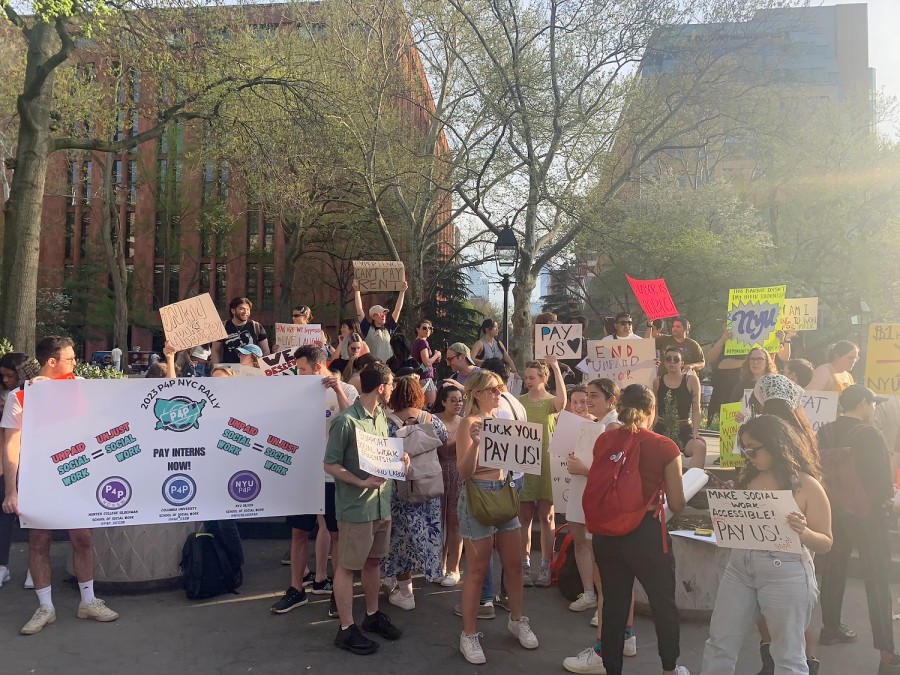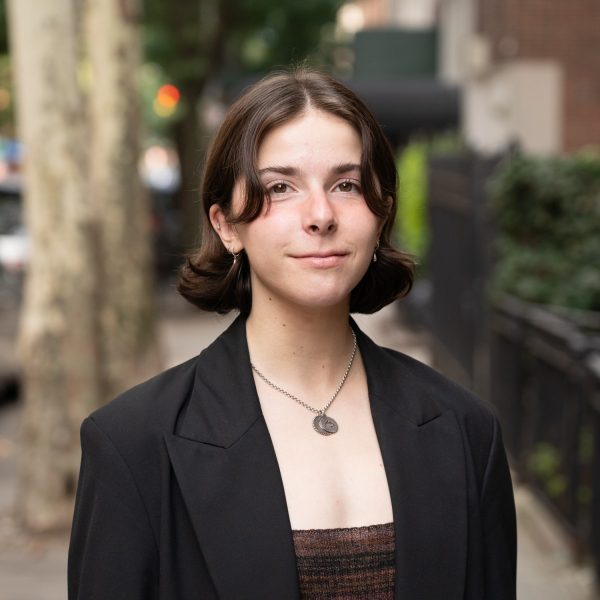Social work students demand compensation for unpaid work hours
Students at NYU’s Silver School for Social Work are calling on the university to pay for the hours they spend in the field, joining a movement of graduate social work students across the country.
Students studying social work at three major New York institutions gathered in Washington Square Park on Friday, calling for an end to unpaid work requirements. (Carmo Moniz for WSN)
April 19, 2023
Mia Halsey, a second-year student at NYU’s Silver School for Social Work, spends over 20 hours each week providing counseling and social services to people accused of crimes in the public defense system. Her work, which requires her to manage a 10-client caseload, is part of a 1,200-hour field requirement that all students in the graduate social work program are required to complete. Even though Halsey and other Master of Social Work students do much of the same work as paid professionals, their jobs are unpaid.
Halsey balances her field work, which takes up three full work days each week, with six hours of classes every weekday and a weekend job at a bar. She said that the structure of NYU’s social work program exhausts students, deteriorates the quality of their work, impacts their academic performances and negatively affects their health and relationships.
“I have a pretty exhausting schedule, where I basically am obligated to [always] be doing something, whether it’s paid work or unpaid work or being in class,” Halsey said. “I don’t ever really feel like I have a break or a chance to recover.”
According to Halsey, many of the public and nonprofit organizations to which social work students are assigned rely on unpaid labor as a means of avoiding the expense of additional paid employees. Silver partners with over 600 organizations to place students in field positions — nearly all of which are unpaid. Students do not have any say over where they are placed.
Many students at Silver have taken on student loans or sought out additional jobs so they can afford tuition, which runs at around $54,000 annually. Their field work assignments do not qualify for the Federal Work-Study program, which provides government funding, intended to cover a portion of the worker’s compensation, to employers.
Other students in the program have reported similar experiences. Sarah Rongey, a first-year grad student at Silver, said she has borrowed the maximum amount available to her in student loans so that she can pay for tuition. Like Halsey, she also works a part-time job in addition to her placement work.
“I’m not even starting my career yet and I’m burnt out,” Rongey said. “NYU is a very rich school, and the very least that it can do is to pay us for our work.”
The Master of Social Work degree takes two years to complete as a full-time student at Silver, but can take up to four years to finish for part-time students in the school’s extended program. The program has an incoming class of around 400 students each year, and the two-year program is the most popular at the school.
Master of Social Work degrees are required for advanced social work positions, which span the fields of education, administration and health care. While bachelor’s degrees in social work are enough for some positions, these are typically entry-level jobs that are difficult to advance in without a higher education degree.
Full-time MSW students at Silver typically spend around 21 hours per week working in their field placements. The 1,200 hours of field work that MSW students at Silver are required to complete are more than the 900-hour standard set by the Council of Social Work Education, the national accreditation body for social work schools.
Field placements count as a four-credit course each semester, so students pay for their placements as part of their tuition — even though the agencies they work with can charge clients for the services they provide.
In September, a group of students at the school joined Payment for Placements, a national organization that advocates for social work students to be paid for field work. NYU’s P4P chapter is calling on the university to pay for their wages directly.
Most recently, the university’s P4P chapter took part in Payment for Placement’s National Week of Action, during which social work students across the country participated in protests and walkouts. At NYU, the week culminated in a rally at Washington Square Park on April 14. P4P organizers from other universities in New York, such as Columbia University, Hunter College and Stony Brook University, joined Silver students in demanding payment for their placement work.
Organizers gave speeches at Garibaldi Plaza, with many saying that the field work requirement negatively affects their financial status and personal lives. Some held signs reading “NYU makes me pay to work” and “Experience can’t pay rent,” while others chanted, “Exploitation is not our vocation.”
In a speech at the rally, Halsey, the student working in the public defense system, said that though working to change the field work system can be tiring, it has also made her feel less alone.
“When I enrolled at NYU Silver, I did not realize that ‘field placement’ was a euphemism for a mandatory, unpaid job,” Halsey said. “I have been in survival mode for two years. I have watched my classmates experience the same and worse.”
Organizers with P4P have met with administrators multiple times over the past several months to discuss securing wages and reducing the required hours of field work. Administrators have said that they “stand in solidarity” with students and are looking into “legislative solutions” to their demands, but organizers say that the university’s response has been insufficient.
In December, the group chose to stop meeting with Silver administrators until their concerns are addressed in a “meaningful” way.
In an email to students in February, Silver dean Michael Lindsey announced a new $50,000 fund which would cover onboarding costs, such as fees for required background checks, at social work agencies. Lindsey said the fund will cover these costs for students with financial need starting in the fall of 2024, and will be used to reimburse students who demonstrate need for costs incurred during the 2022-23 academic year.
In the email, Lindsey said he also met with the deans of social work schools at Columbia, Fordham University and Hunter College to discuss reducing the number of required field work hours to the minimum designated by CSWE — a reduction of 300 hours.
In a statement to WSN, Lindsey said that he encourages students to work with administrators to further their goals. He added that the school is exploring more ways to reduce placement-related costs.
“As social work educators, we support advocacy as an essential strategy for creating systems change,” Lindsey said. “I began my tenure in July committed to addressing and eliminating financial barriers to obtaining a social work education at Silver, as well as making education more accessible to a diverse candidate pool of students. These are critical components of our vision for the school.”
Natalie Chang, a second-year student in the social work program who is an organizer with P4P, said that many social work students feel exploited by the placement program and believe that it goes against the values of social work as a field. Chang, who is graduating in May, said that while she knows the group won’t achieve payment for field work by the time she graduates, she believes it is important to continue the fight for future students.
“Those 1,200 hours of work are expert work — they’re labor. We’re providing therapy to clients, we’re giving services that full-time employees of those agencies also provide,” Chang said. “It was framed to us as educational, but we are of the belief that both of those things can be true — that we’re learning, but that we’re also providing labor that should be compensated.”
Contact Carmo Moniz at [email protected].



























































































































































